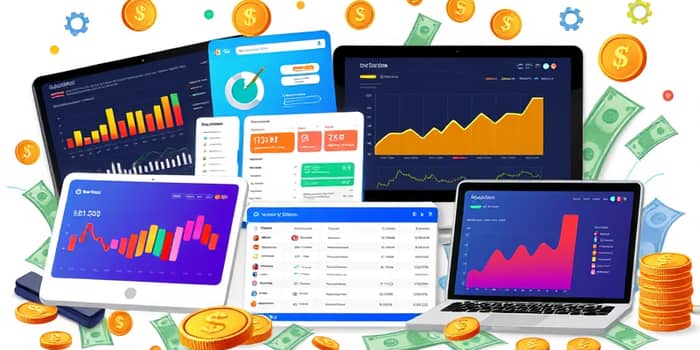Tracking expenses is a fundamental step toward financial empowerment, yet many people dread the tedium of spreadsheet reconciling. This article explores modern alternatives that deliver efficiency, clarity, and advanced insights without requiring endless rows and formulas.
Why ditch spreadsheets?
Spreadsheets have long been the default tool for expense tracking, but they come with limitations. Manual data entry can lead to formula errors, misplaced decimal points, and broken links that skew your financial picture. Updating categories, copying transactions, and reconciling accounts becomes time-consuming and prone to mistakes.
In contrast, specialized expense apps and tools offer real-time analytics and automated categorization. By connecting directly to your bank and credit accounts, these solutions eliminate repetitive tasks, provide visual dashboards, and even suggest budget adjustments based on your habits.
Top personal expense tracking apps in 2025
A diverse range of apps now caters to every budgeting style, from zero-based frameworks to envelope systems. Below is a snapshot of leading personal finance apps for 2025:
Empower’s dashboard excels at comprehensive net worth monitoring without fees. PocketGuard’s zero-based approach ensures every dollar has a purpose, while EveryDollar integrates with credit cards or manual entry for flexibility.
Rocket Money stands out for bill negotiation and subscription management. Goodbudget’s envelope method appeals to those who prefer tangible controls, and Quicken Simplifi offers a unified financial overview at an entry-level price.
Best business expense tracking tools
Small to mid-sized businesses demand features like approval workflows, project linkage, and detailed reporting. These solutions streamline operations and support compliance:
- BigTime: real-time expense tracking, project linkage, live reports, approvals, invoice integration.
- Expensify: automated receipt scanning, expense categorization, audit trails, policy enforcement.
- Zoho Expense: OCR receipt capture, report automation, AI insights, Zoho suite integration.
- QuickBooks: mobile receipt capture, auto-import, full accounting suite connectivity.
Getting started: setting up no-spreadsheet tracking
First, choose an app that aligns with your needs—whether zero-based budgeting, envelope systems, or full financial snapshots. Ensure it offers secure bank integration and two-factor authentication.
Next, connect your bank and credit accounts. Most platforms support thousands of institutions, automatically importing transactions in minutes. This step unlocks instantaneous transaction updates across platforms without manual uploads.
Then, scan or import past receipts using OCR technology. Once uploaded, AI-driven categorization suggests the right budget categories, saving time and reducing human error.
Finally, define spending categories and set budget limits. Customize notifications to alert you when you reach 80% of any budget or exceed a category. Monitor your dashboards regularly on mobile or desktop for ongoing financial clarity and control.
Manual, non-spreadsheet alternatives
- Mobile notes apps: use phone notes or a dedicated list app to record daily expenses quickly.
- Envelope budgeting system: allocate cash into physical or digital envelopes for each category.
- Embedded bank trackers: leverage spend analysis features in banking apps like Huntington’s Spend Setter.
- Specialized notebooks: use a pre-printed ledger to log expenses by hand.
Pros and cons of non-spreadsheet tracking
Modern tools offer automated categorization via AI and interactive dashboards across devices, reducing manual workload and providing insights at a glance. Many solutions include savings goals and debt-payoff planners, helping you visualize progress in real time.
On the downside, subscription fees can range from $6 to $18 per month after free trials. Privacy is another concern—sharing bank credentials with third parties requires trust in encryption standards. Some apps may not match the fully customizable reports possible with spreadsheets, and dependence on a software provider can introduce risks if the service changes terms or discontinues.
Expert tips for consistent budgeting
- Schedule a weekly review of imported transactions to catch errors early.
- Set push notifications for budget limits and unusual spending.
- Conduct a monthly subscription audit to cancel unused services.
- Adjust category allocations quarterly based on changing priorities.
- Compare actual spending to budgeted amounts using app reports.
Market trends and statistics
Budgeting apps boast average ratings between 4.6 and 4.7 on major app stores, reflecting wide user satisfaction. Industry experts recognize 41 core business expense categories, ensuring comprehensive tracking for organizations of all sizes.
Financial advisors often recommend saving at least 5% of monthly income. Apps employing zero-based budgeting—such as PocketGuard and EveryDollar—help allocate every dollar purposefully, whereas envelope systems like Goodbudget remain appealing for users seeking hands-on cash management. The global market for personal finance apps is projected to grow 8% annually through 2028, driven by rising demand for automated expense analytics tools.
Conclusion
Whether you’re an individual eager to simplify monthly budgeting or a business striving for streamlined expense approval workflows, leaving spreadsheets behind can transform your financial workflow. Modern tools deliver instant categorization, real-time visibility, and proactive alerts, empowering you to make confident decisions.
Begin by choosing an app that matches your style, connect your accounts securely, and follow best practices for regular reviews. With these strategies in place, you’ll spend less time on data entry and more time advancing your financial goals.
References
- https://www.nerdwallet.com/article/finance/best-budget-apps
- https://www.bigtime.net/blogs/the-best-business-expense-tracking-app/
- https://www.emburse.com/resources/top-8-expense-management-mobile-apps-for-2025
- https://www.cnet.com/personal-finance/banking/best-budgeting-apps/
- https://www.moneyfit.org/budgeting-tools-for-2025-success/
- https://www.huntington.com/learn/budgeting/how-to-make-a-budget
- https://www.fylehq.com/blog/business-expense-categories
- https://www.investopedia.com/financial-edge/1109/6-reasons-why-you-need-a-budget.aspx










